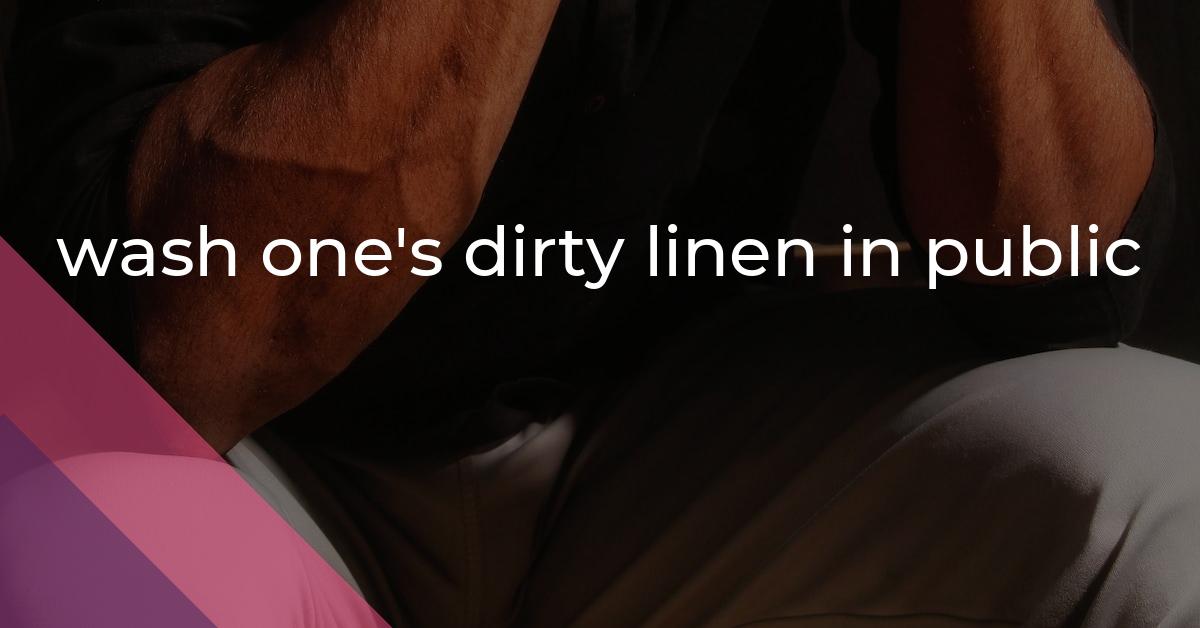wash one’s dirty linen in public: Idiom Meaning and Origin
What does ‘wash one's dirty linen in public’ mean?
The idiom "wash one's dirty linen in public" means to discuss or expose private or embarrassing matters in a public or inappropriate way.

Idiom Explorer
The idiom "wipe the slate clean" means to start fresh, without any mistakes or issues from the past. It implies removing any negative history or burdens, allowing for a clean and new beginning.
The idiom "wash one's dirty laundry in public" means to discuss private or embarrassing matters in a public or inappropriate setting, making others aware of personal problems.
The idiom "washed out" means to be exhausted or worn out, both physically and emotionally. It can also refer to something that appears faded or lacking in color or intensity.
The idiom "warts and all" means to accept or depict someone or something in their entirety, including their flaws and imperfections. It emphasizes the importance of embracing and showing the complete truth, without hiding any unfavorable aspects.
The idiom "walk the dog" means to take the responsibility of performing a task or fulfilling an obligation, often for someone else's benefit or convenience.
The idiom "walk on the wild side" means to engage in risky or unconventional behavior, often associated with breaking societal norms or boundaries.
The idiom "walk on eggshells" means to proceed with extreme caution and sensitivity in order to avoid upsetting or angering someone.
The idiom "walk on broken glass" means to endure a tremendously difficult or painful situation without showing any signs of discomfort or weakness.
Hidden Histories
Wash one's dirty linen in public is an idiom with origins in the laundry process. It has evolved to have figurative meanings in modern times. This common phrase is used to express openly discussing or revealing private, embarrassing, or shameful information in public. It is considered socially unacceptable to wash one's dirty laundry in public, as it implies a lack of discretion and respect for privacy.
The literal meaning of the idiom can be traced back to the practice of washing laundry. Linen, which refers to clothes or items made from linen fabric, was traditionally washed in private. Washing dirty linen in public was considered shameful because it aired one's personal or family issues for all to see. This transitioned into a metaphorical sense over time, representing the act of discussing private matters or revealing personal problems in a public setting.
Metaphorically, the idiom implies a lack of discretion and respect for privacy. It is often used in situations where personal or family matters are openly discussed, such as relationship problems, family disputes, personal conflicts, or embarrassing incidents. By using this idiom, speakers aim to highlight the impropriety of discussing such private affairs openly, as it can lead to unnecessary gossip, public humiliation, or damage to one's reputation.
The idiom "wash one's dirty linen in public" is widely used in spoken and written English. It is often employed to criticize individuals who openly discuss private matters that should remain confidential. This phrase can be witnessed in various contexts, including personal relationships, business, politics, and the media. For example, if a celebrity publicly discusses their divorce proceedings or a company publicly addresses its internal disputes, they can be accused of washing their dirty linen in public.
This idiom serves as a reminder of the boundaries between public and private life and highlights the importance of discretion and privacy. However, its interpretation can vary depending on the context and cultural norms. While it generally implies negative judgment, there may be situations where discussing private matters in public is appropriate or necessary, such as seeking support or raising awareness about important issues. Regardless, it is important to consider the potential repercussions of airing private matters to the world.
A related idiom, "air one's dirty linen in public," has a similar meaning. It also refers to openly discussing private or personal issues in public. This idiom emphasizes the idea that such behavior is inappropriate and can lead to negative consequences. Like "wash one's dirty linen in public," it warns against lacking discretion and respect for privacy.
"Dirty laundry" is another related phrase that can be used interchangeably with "dirty linen." It is a metaphorical term that refers to personal or private matters that should remain confidential. When someone "air's their dirty laundry," they are openly discussing these private matters in public, often with negative implications.
Another related idiom is "dish the dirt," which means to spread gossip or share scandalous or negative information about someone or something. This phrase is often used in a context where someone is divulging or revealing such information, similar to airing one's dirty linen in public. It can be seen as a more informal or colloquial way of expressing the same concept.
Lastly, "get the dirty water off one's chest" is another related idiom that conveys the act of confessing or revealing something negative or burdensome. It implies a sense of relief or catharsis that comes from sharing this information. While slightly different in meaning, it shares similarities with the other idioms in terms of openly discussing private or shameful matters in a public setting.
Example usage
Examples of how the idiom "wash one's dirty linen in public" can be used in a sentence:
- He shouldn't have aired his family's personal problems on social media. It's never a good idea to wash one's dirty linen in public.
- The politician's scandalous affair became headline news, showing how he chose to wash his dirty linen in public.
- She openly criticized her colleagues during the staff meeting, which was a clear case of washing her dirty linen in public.
More "Etymology" idioms



